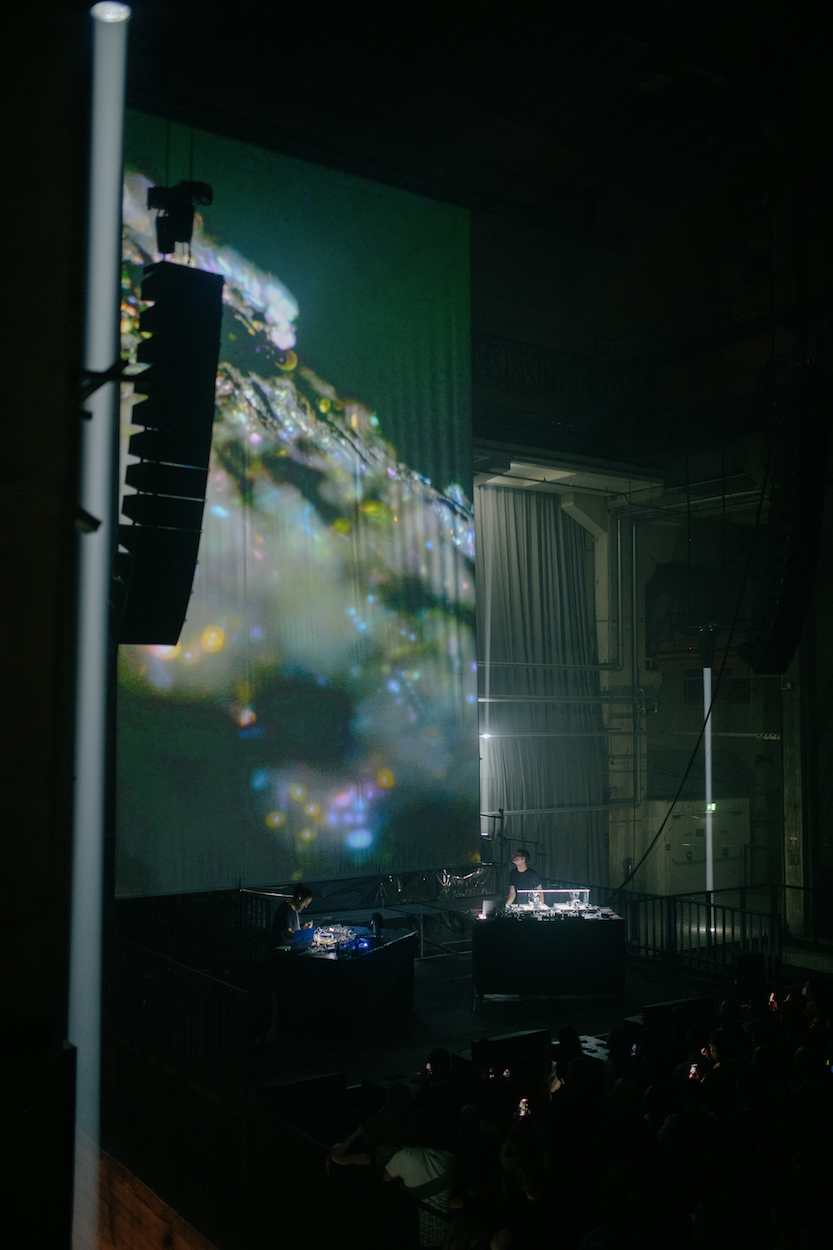Alessandro Cortini & Marco Ciceri on ‘Nati Infiniti’
Credits
CREDIT Berlin Atonal/ Helge MundtXYZ: You’ve both been in the scene for more than a few years. To what extent would you say you have developed and changed as human beings and as artists throughout the last years of your careers?
Marco Ciceri: I think over the years the most important development has been the refinement of my taste, I became quicker in understanding what I like.
Alessandro Cortini: I don’t think I could pinpoint how, but like everything else, my way of being and making has changed over time. I also don’t believe the how is meaningful, as long as it happens.
XYZ: What happens when you give music a visuality? And what should it do to the listener/viewer?
M.C: With the visuals, I try to enhance the live experience and follow Alessandro’s music but during the show, we both influence each other. It’s not just one-directional, it’s a dialogue. In his improvisation, Alessandro looks at the screen and responds, adapts or contrasts what he sees on screen. There is nothing in this show designed to have a specific effect on the listeners/viewers, the improvisation it’s mostly a back-and-forth between us that eventually might resonate with the audience.
A.C: I believe electronic music, lacking the more physical aspect of the performance, makes a perfect candidate for marrying visual art as an additional conduit for expression.
XYZ: Marco, what was your personal process for visually supporting ‘Nati Infiniti’? How do you transform sounds into images?
M.C: The visuals for ‘Nati Infiniti’ are improvised just like the music. They are not a translation of the music but instead my form of expression in conversation with the music.
A.C: the concept of ‘Nati Infiniti’ is based on the superimposition of unclocked sequences, which develop motivs that never repeat, infinite.
XYZ: Berlin Atonal is a festival of visual and audible art with a certain history – what makes the festival special for you?
M.C: History plays a big role in the importance of Atonal. The great venue and the competent audience are additional factors that make it a special event.
A.C: I have been privileged to always premiere my works there and I feel like it wouldn’t be the same if weren’t to share this moment with my family at Atonal. It feels like home.
XYZ: You are both from Italy – you even currently live in Berlin Marco, the location of Berlin Atonal. To what extent are your Italian roots reflected in what you do and why do you find Berlin both an inspiring and exciting place to hold an art festival like Berlin Atonal?
M.C: I don’t think my Italian roots play any role in my art. I think Berlin was in a condition that made it easy for musicans to come and have success.
A.C: No relevance whatsoever.
XYZ: In what way do you think the art scene is currently changing and perhaps the way we “consume” art of any kind?
M.C: I think most of the art we consume is through social media and this is not necessarily bad because through them it can be seen everywhere, but it is surely a limited experience. In general, I see our art steering towards shows designed just to become cool posts leaving aside the quality of the live experience. On the contrary, we prioritise the live experience over the social media appeasement.
A.C: I have stopped paying attention to what happens outside my world before the pandemic, and it allowed me to feel more at ease with myself as a human and a musician. I have issues with how music and art are consumed these days, but I leave them aside in order to concentrate on the path yo happiness.
XYZ: In addition, the ways in which we can create art are developing and changing, especially digitally. How are you facing this? Which ways do the new technical possibilities open up for you and what would you be afraid of losing in this increasing digitalization?
M.C: I like to observe and test new trends but at the same time, I tend to use tools that serve my purpose independently from the fact that they are new or old. I am afraid that the boundary between an art piece and a mere display of a new technology could become so burry that new tech could outcast even more art from its spaces.



